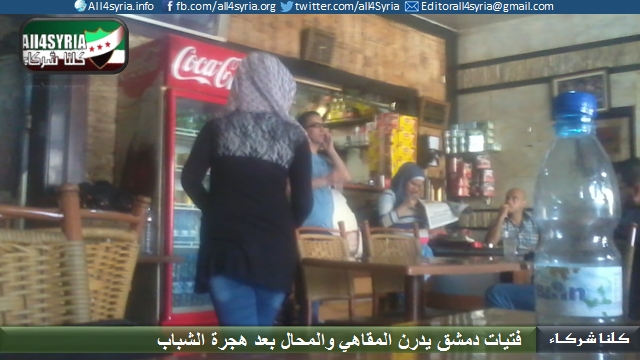Amid difficult living conditions and a drop in the number of young males in the capital Damascus, an unfamiliar phenomenon has begun to emerge in regime-controlled areas — the increase of the number of women in daily work usually undertaken by men, as many have suddenly become the primary breadwinner for their families.
On the road to the new Al-Zahara district in southern Damascus, the number of coffee shops have spread notably recently. The first one to receive customers at the door are girls, one of whom is no more than 18 years old. Some of them wear shameless clothing and others clothing which has a sort of decency. They greet the customers and accompany them as they choose a table to sit at, and then they take their orders and come by every now and again until they finish, and then they take the bill and the tip.
One of them was wearing a hijab, jeans and a long shirt, and was offering a smile to the customers which was clearly artificial. She summed up her response in a few words — “live it to God” — in response to a question about the reason for the situation which she was in, as this task used to be monopolized by young men. After bringing a cup of tea, and then a shisha, she said that she was holding back tears, because she was “forced” because she and her mother were now “the main breadwinner” for three children who fled with them from the Homs countryside after shelling destroyed their house and killed her father and her two older brothers.
The girl did not hide that what she earned from the coffee shop owner “was no more than 25,000 Syrian pounds in a month, and that is almost not enough for one person.” She noted that there were “respectable and kind people” who gave her tips and added: “With what my mother earns from cleaning houses from time to time, we can manage our affairs.”
Another girl who was working in a coffee shop in one of the districts of Old Damascus said that she worked from evening until midnight, and did not find it embarrassing to reveal “the harassment she is subjected to from some of the customers.” She says: “Most of them are (loyalist) shabeeha, and they think that they can buy people’s dignity… the situation is extremely difficult. I’m forced to work and bear the harassment but to a specific limit.” She noted that the question of returning to her home in the outskirts of the capital in the middle of the night was a “daily worry” in light of the current security situation.
In Damascus’ markets, it has become a familiar sight to see girls working in shops selling readymade men and women’s clothes and in supermarkets and sweets and ice cream shops. According to newspaper reports, the official numbers indicate that women in Syria do not constitute more than 16 percent of the Syrian workforce, and that the rate of unemployment among women was about 11.1 percent in 1994, and almost doubled between 2004 and 2009. Among men the rate was 6.3 percent and went up to about 10.5 percent during the same period. But the numbers during the last five years despite their rarity suggest a major change in favor of women after many sectors have begun to call on female workers to fill the gaps.
Today, after a large number of young men have migrated to flee their compulsory and reserve service in the regime army and the rarity of work opportunities, one roaming in the regime-controlled areas has begun to notice that the markets and public places are crowded with women. According to reports quoting an economic expert from Damascus who refused to be identified for security reasons, the dominance of females over males in the markets and public places was about 80 percent.
As a natural result, women workers have contributed to raising the proportion of activities which Syrian women carry out compared to men by nearly 40 percent on average, according to what the economic expert said. He noted that this rate raised to 90 percent at the end of last year and the beginning of the current year as a result of the conditions imposed on men by the war.
This article was translated and edited by The Syrian Observer. Responsibility for the information and views set out in this article lies entirely with the author.


